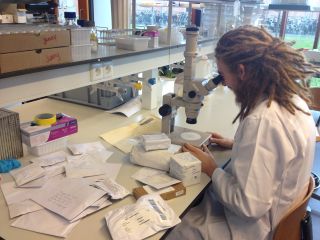Infravec2 activities will situate insect vector control in an historic, cultural and anthropological context. Social science tools are being developed to promote the active involvement of societies for the most effective vector control interventions to protect human and animal health.
Citizen Science for connective action in European vector surveillance programs
History has demonstrated that disease intervention programs may fail simply because they do not take the social dynamics of relevant stakeholders and affected communities into account. Gathering information and data through citizen participation, together with the active input obtained from scientists, allows greater flow of data to be acquired, and adds scientific value to vector surveillance programs. This activity of Infravec2 (led by Sander Koenraadt at Wageningen University) is developing a standardized Citizen Science platform with a common informatics tool to facilitate collection and dissemination of scientific information, with a common organizational and informatic backbone for Citizen Science initiatives in Europe.
COLLECTION OF MOSQUITO NUISANCE DATA
![]() The NatureToday platform is used for collection of mosquito nuisance data in the Netherlands. The same platform is in a pilot testing phase for the collection of malaria mosquito data in Rwanda
The NatureToday platform is used for collection of mosquito nuisance data in the Netherlands. The same platform is in a pilot testing phase for the collection of malaria mosquito data in Rwanda
MORE ABOUT A GLOBAL INITIATIVE TO DEVELOP CITIZEN SCIENCE PLATFORMS TO COMBAT VECTOR-BORNE DISEASES
Wilson Center – Science and Technology Innovation Program
History and anthropology of mosquito control
This Infravec2 activity is working to uncover and recount the fascinating history of mosquito control both for documenting one of humanity’s most concerted and serious cultural endeavors, and for highlighting earlier insect control measures that are overlooked but may still have utility. Over the last one hundred years, mosquito control measures have spanned the range from ritualistic avoidance to genetic modification. Some of these control measures escalated to the level that they became a “war” with nature, pitting humans against insects, consuming vast resources and deploying armies of healthcare workers. The case study for this research is the Mediterranean region and its many types and forms of mosquito control projects over the twentieth century.
MOSQUITOPIA: KILLING MOSQUITOES? THE PROS AND CONS
Marcus Hall and Dan Tamir discussed the possibility of eradicating mosquitoes from the globe during the Rachel Carson Legacy Symposium, “Mosquitopia? The Place of Pests in a Healthy World” (24–27 October 2019). Information can be found in three blog posts and a short video. Morevover a book has been published.
MORE ABOUT THE SARDINIAN MALARIA CONTROL CAMPAIGN
Movies about a major mosquito eradication campaign, the Sardinian Project (1946-1951). It was directed by the Rockefeller Foundation and financed mostly with Marshall Plan money.

Identifying mosquito specimens sent in by mail by the general public for Muggenradar, a Citizen Science initiative on mosquito nuisance in the Netherlands (©S. Koenraadt).

